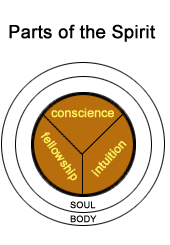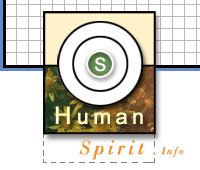III. The Definition of the Human Spirit
The human spirit is the organ whereby we contact, receive, and contain God the Spirit. In order to substantiate anything we must use the proper organ. To appreciate the harmonious sounds of a symphony orchestra we must use our ears. To luxuriate in the lush colors of a tropical rain forest we must use our eyes. Likewise, to appropriate and enjoy all that God is to us, we must use the proper organ — our human spirit. The reason people say there is no God is because they have failed to know and use the organ that substantiates the reality of God, the human spirit. To know God, to touch God, to contact God, to enjoy God, we must first know that we have a spirit, and secondly, we must use our spirit to contact God. (Witness Lee, The Spirit 62)
Origin of the Human Spirit
The origin of man's spirit is God's breath of life. The human spirit was produced when God breathed the breath of life into Adam's nostrils. This fact is clearly proven by comparing the original Hebrew texts of Genesis 2:7 and Proverbs 20:27: the Hebrew word neshamah, translated “breath” in Genesis 2:7, is the same word translated “spirit” in Proverbs 20:27, which speaks of the spirit of man. Thus, God's breath in creation produced man's spirit. (Witness Lee, The Spirit 13, 63-64)
(top)
Composition of the Human Spirit
Just as our human being is tripartite, our human spirit is also composed of three parts: the conscience, fellowship, and intuition. The conscience is that part which enables us to perceive right from wrong and which, accordingly, either condemns or justifies us. Through the faculty of fellowship, we are able to contact God and commune with Him. Finally, through our intuition, God imparts to us a direct, particular sense or knowledge which is independent of reason, circumstance, situation, or precedent. These three faculties of the spirit, conscience, fellowship, and intuition, are clearly described in Scripture.
The primary, leading part of the spirit is the conscience. In Romans 9:1 Paul testifies, “…My conscience bearing witness with me in the Holy Spirit.” When this passage is compared to Romans 8:16, “The Spirit Himself witnesses with our spirit…,” it becomes apparent that the conscience is located within the human spirit. The Spirit of God witnesses with our human spirit, yet at the same time our conscience witnesses with the Holy Spirit. By association, then, the conscience must be a component of the human spirit.

The Scriptures likewise reveal that the function of fellowship pertains to the spirit. Christ Himself told us that “God is Spirit, and those who worship Him must worship in spirit and truthfulness” (John 4:24). Worshipping God is altogether a matter of contacting God in fellowship. Furthermore, Ephesians 6:18 mentions “praying at every time in spirit,” another form of fellowship with God. Based on these verses we can conclude that fellowship is an additional component of the human spirit.
(top)
Finally, we see in the Scriptures that intuition is also a part of the spirit. First Corinthians 2:11 says, “For who among men knows the things of man, except the spirit of man which is in him?.…” This verse shows us that there are matters which only the spirit of man knows, and which the soul is unable to know. This function of our spirit, our intuition, has the capacity to know and discern apart from human reason or circumstantial experience. For example, in the Gospel of Mark the scribes were silently reasoning within their hearts about the Lord's statement, “Child, your sins are forgiven” (2:5). Perceiving these unspoken thoughts and responding to them, “immediately Jesus, knowing fully in His spirit that they were reasoning this way within themselves, said to them, Why are you reasoning about these things in your hearts?” (2:8). This verse further illustrates that the spirit can have an inner sense and knowledge independent of both the reason and the outward circumstances upon which the soul's discernment relies so heavily. This spiritual sense, or intuition, is an essential faculty of the human spirit. (Witness Lee, Economy 56-59)
Function of the Human Spirit
To Contact God
(top)
The Lord Jesus explained in John 4:24, “God is Spirit, and those who worship Him must worship in spirit and truthfulness.” To worship God is actually to contact Him, based on the etymology of the Greek word here rendered “worship,” proskuneo. This term derives from pros, meaning “toward,” and kuneo, meaning “to kiss.” Thus, “worship” literally signifies “to come forward and kiss.” To kiss is to make intimate contact with another person. Similarly, we contact God in the most personal, intimate way when we touch Him as the divine Spirit in our human spirit. (Vine 1247)
To Receive God
We receive God initially when we are born anew. This new birth takes place in our spirit, for according to John 3:6, “…that which is born of the Spirit is spirit.” Not only does our spirit function to receive God initially; it continues to function to receive God as the Spirit for the rest of our Christian life. The Lord prophesied of this New Testament experience in Ezekiel 36:26: “I will also give you a new heart, and a new spirit I will put within you….” God wisely gives His believers both a new heart to love Him and a new spirit to receive Him. As a physical illustration, our heart may love many things, but without the exercise of the appropriate faculty in order to receive those things, they can never be substantiated and enjoyed by us. For example, to apprehend and appreciate sound, we must exercise our ears, just as color is substantiated by the exercise of our eyes. Neither can we receive food without exercising our mouth. Likewise, to receive God it is crucial that we exercise our spirit.
To Contain God
Finally, our spirit functions to contain God. Second Timothy 4:22 says definitively, “The Lord be with your spirit.” This word unambiguously designates our human spirit as the site where God makes His abode in us. Since the Lord lives within our spirit, we can accurately describe our spirit as a container of God.
(top)
Main |
Scriptural Basis |
Historical Perspective |
Definition
Regeneration |
Importance |
Knowing |
Exercising
Real Christian Life |
Conclusion |
Bibliography |
Links
© Christian Websites 2003.
|




